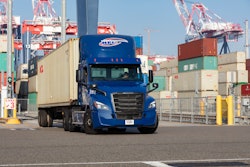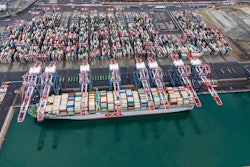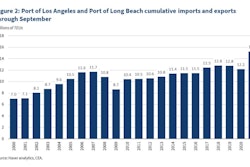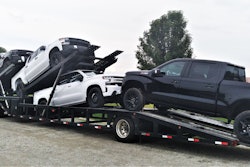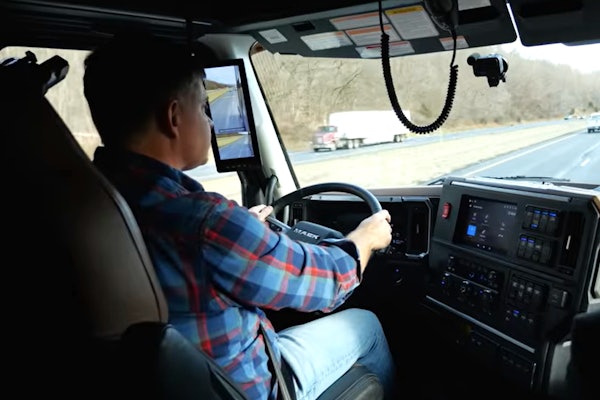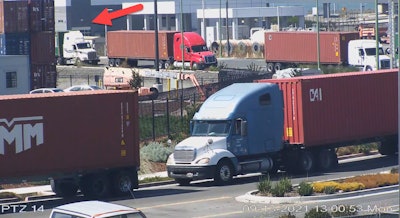
Thanks to the unprecedented global pandemic and its impact on the demand for physical goods over the past year and a half, supply chain issues have become mainstream front page news, with the International Chamber of Shipping issuing an open letter to the United Nations that warns of a "system collapse" across the world.
President Joe Biden on Tuesday echoed that fear, announcing that the Ports of Los Angeles and Long Beach would shift to 24/7 operation along with some major carriers and retailers to expedite the clearing of bottlenecks, but port professionals' views of the issues suggest the efforts may well miss the mark.
As of late September, the U.S. had a reported 170 ships waiting to unload in its ports, then setting a new record, and it's continued to be an issue. Some ships have been required to drift unanchored off-shore as good spots for anchoring dwindle like too few truck parking spaces off a major highway.
Now the ports are where the traffic jam at sea extends into the traffic jams on land, and where the containers so vital to the intermodal industry begin their journey. From freight-platform operators to small fleet owners, owner-ops and company drivers, Overdrive spoke to men and women of the intermodal segment to get a look at what's going on at our nation's ports and railyards for this series, part of our occasional "Niche Hauls" series of close looks at various freight segments where owner-operators are in demand.

Trucking in the intermodal niche is like trucking everywhere to some degree -- common problems for those hauling into and out of U.S. ports and rail yards include trouble sourcing parts, for small fleet owners recruiting and holding on to drivers, and other well-known difficulties. On the flipside, and also just like most other truckload niches, there's high demand for intermodal haulers, with plenty work to be done and money to be made.
'Perfect storm' at the ports
Nimesh Modi, CEO of Bookyourcargo.com, a shipping and drayage freight-forwarding platform, said that at ports across California, he sees headaches getting worse before they get better, and it's the boom in ecommerce and demand for physical goods that's pulled the supply chain past the breaking point.
"We move containers from ports to customer locations and vice versa. We’re an unavoidable but neglected part of the supply chain. Nobody wants to build it, but everyone has to use it," said Modi of his port drayage corner of the supply chain.
Unfortunately, Modi has seen drayage truck driving jobs at the ports go as unloved as the ports themselves.
"We hear the stories about truckers going away, or a driver shortage, and it's negligence that causes a lot of this disruption," he said. "The attention to make their job enjoyable is gone. Nobody is paying attention to them."
As for Biden's plan to shift to a 24/7 port system, Modi likened the move to trying to treat a disease with vitamins and supplements.
"It will help, but not solve the problem," he said. "While it will help ocean vessels slowly and steadily get into port and unload cargo, it creates a storage issue due to driver, rail and chassis shortages. The supply already greatly outweighs the available infrastructure to move the cargo out of port, now you are adding more to it with limited ways to move it.”
Modi said drivers are finding linehaul and warehousing work that pays almost as well without the headaches.
"What’s happening very fast is instead of standing in line at the port at 3 a.m. they feel fine to go to the distribution center or Amazon warehouse to pick their load, move and deliver those last miles, and come back home in the evening. Even if they have to compromise a little bit of pay, they’re meeting their families at the end of the day."
Small fleet owner Bill Aboudi of Oakland Port Services Corporation said mega freighters and mismanagement had created a "perfect storm" of inefficiencies compounding these issues. Not every day, but some days, the problem seems impossible to surmount, according to Aboudi.
Add to that the compounding issue of an intermodal chassis shortage gumming up the works. Modi said that prices and lag times will balloon, with containers that took one day to unload onto a chassis now taking four days, and containers that used to cost $3,000 or so to move now costing $17,000.
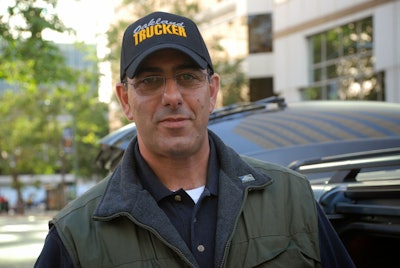 Small fleet owner Bill Aboudi
Small fleet owner Bill Aboudi
"They're doing it for their convenience without thinking of everybody else," said Aboudi. "Why can't they be efficient? Because they're making tons of money off demurrage per diem," charged back to the customer paying the freight, "and the chassis leasing companies leasing chassis to us per day."
Aboudi believed shipping lines have thus little incentive to effectively work through delays with trucking service providers. "They don't care," he added about the backlog. With chassis leasing, a trucker might "keep the chassis for a hundred days. It has been a real issue with us."
The Owner-Operator Independent Driver's Association echoed Aboudi's charge when they noted in a statement issued after Biden's announcement Wednesday that "the real bottlenecks in the supply chain occur at pickup and delivery points, adding more trucks and drivers will simply makes the lines longer, not faster."
Direct compensation for drivers' time could go a long way, OOIDA also said, providing at least some of that incentive for parties to work together to get them in and out efficiently. OOIDA's statement also contradicted Modi's and others' "driver shortage" claims. "Let’s be clear, the current supply chain crisis is not due to a shortage of truck drivers!" Rather the association pointed to working conditions, generally, and compensation specifically, as areas of improvement that might alleviate carriers' difficulties hiring and/or hanging on to drivers.
Aboudi added that, as crafty fleet owners and owner-ops often do, some carriers found a way around port inefficiencies by doing what they called "street turns" -- then terminals found a way to effectively tax that activity, too.
A street turn is when "somebody has an empty and they're in line, and we need that empty, so we just exchanged those containers outside the Marine terminal. That saves two moves at the Marine terminal," said Aboudi. Steamship lines responded to this by charging $25 to street-turn a container -- that further cut into drayage trucking companies' already thin margins.
Overall, the mismanagement leads to drivers waiting in line for hours at the ports and sometimes going home empty-handed. --Senior Editor Tom Quimby contributed to this report.
Next in this series: Sky-high rates turn intermodal challenges into opportunity
Associated podcast: Supply-chain crunch at the ports: Perspective from out East

